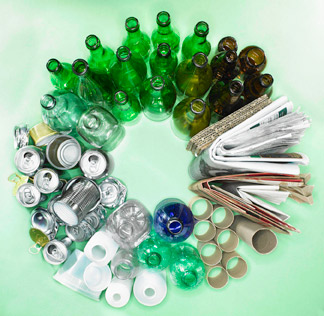Recycling today is considered by many to be a huge success, though Americans could be recycling more than they do. Well managed recycling systems that focus on profitable resources like glass, paper and metals have had the most success. Photo cred: Digital Vision
EarthTalk®
E – The Environmental Magazine
Dear EarthTalk: Has recycling lived up to its promise to reduce waste and pollution, save energy and provide jobs in our ailing economy? — Ian Atkinson, New York, NY
Americans still don’t recycle as much as they could. Nonetheless, the practice is already considered a huge success given that it keeps about a third of the solid waste we generate out of our quickly filling landfills and saves natural resources while generating much-needed revenue for struggling municipal governments. Recycling also helps us keep our carbon footprints down: According to the U.S. Environmental Protection Agency, recycling one ton of aluminum cans conserves more than 1,665 gallons of gasoline.
Of course that doesn’t mean the progression from virtually no recycling just 40 years ago to today’s U.S. average of 33.8 percent has always been smooth. Some types of materials, especially mixed plastics, have proven difficult and/or expensive to recycle, causing skeptics to question the overall value proposition. But well managed recycling systems that focus on profitable resources like glass, paper and metals have been a big success. And why wouldn’t they be, when recycling uses as little as five percent of the energy required for virgin production of materials such as aluminum?
Sara Brown of Presidio Graduate School reports that, while recycling has gained significant momentum during the last two decades, it has still not yet realized its potential. “Unfortunately, recycling pick-up services are not cheap and it is viewed as a redundant service; extra trucks mean extra cost. On top of that, single stream recycling requires investment in technology to sort the loads efficiently,” she says. “Trash, on the other hand, is far more indiscriminate because everything just goes to one place, the landfill.”
Brown says that the availability of curbside recycling programs varies throughout the country, as does their success. For example, New York City was a pioneer in recycling, but when the city became strapped for cash, recycling rates fell precipitously to just 15 percent and have not recovered. “New York City officials claim it is more expensive to recycle than to send trash to landfills and incinerators for disposal, and that they have to weigh those costs against environmental goals.”
On the other end of the spectrum is San Francisco, which has been steadily increasing its recycling and composting and is now up to over 77 percent. Even more incredibly, the city is aiming for zero waste by 2020. Brown lauds San Francisco for structuring its recycling program to promote the desired behavior. “Curbside fees are charged on a ‘pay as you throw’ basis for trash, while recycling and compost are free, creating a financial incentive for following the law and sorting your waste.” Brown adds that programs like San Francisco’s prove that recycling can be economically viable besides being good for the planet.
Brown acknowledges we’ve come a long way with recycling but that there is still great potential to do more. A November 2011 report entitled “More Jobs, Less Pollution” by a coalition of groups including the BlueGreen Alliance, the Natural Resources Defense Council and Recycling Works! advocates that the U.S. government mandate diverting 75 percent of our waste coast-to-coast by 2030. The result would be 1.5 million new jobs as well as significant pollution reduction and savings in water and other resources.
CONTACTS: More Jobs, Less Pollution Report, docs.nrdc.org/globalwarming/files/glo_11111401a.pdf; Presidio Graduate School, www.presidioedu.org.
EarthTalk® is written and edited by Roddy Scheer and Doug Moss and is a registered trademark of E – The Environmental Magazine (www.emagazine.com). Send questions to: [email protected]. Subscribe: www.emagazine.com/subscribe. Free Trial Issue: www.emagazine.com/trial.








